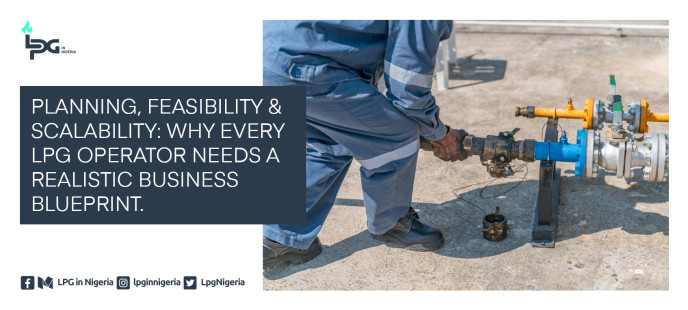- 2643
- 0
Sharing Ideas and Updates on LPG in Nigeria and related information to enable effective collaboration within the LPG Value Chain
Planning, Feasibility & Scalability: Why Every LPG Operator Needs A Realistic Business Blueprint

The Nigerian LPG (Liquefied Petroleum Gas) market is growing rapidly, driven by population growth, government-backed energy transition initiatives, and rising awareness of clean cooking alternatives. However, beneath this optimism lies a harsh reality: many LPG entrepreneurs are struggling.
The common denominator? Lack of planning, poor feasibility assessment, and unrealistic expectations.
“We entered the business full of hope, but reality hit harder than we imagined.”
That’s a sentiment echoed by several contributors on the LPG in Nigeria WhatsApp platform, where operators lament rising costs, competition from large marketers, and declining margins. Many say they jumped into the business based on word-of-mouth success stories or pressure to "own a plant" without doing proper research.
Let’s unpack this crisis and explore evidence-based solutions.
The Root Causes of Failure in the LPG Business
1. Poor Feasibility Studies
In Nigeria, over 60% of SMEs collapse within their first five years, largely due to weak business planning (SMEDAN, 2023). In LPG, this trend is magnified by:
1.Inadequate site analysis
2.Unrealistic sales projections
3.Lack of understanding of market saturation in specific areas
Many investors rely solely on hearsay or third-party consultants without validating the data.
2. Unscalable Capacity
Numerous operators start with 2.5 to 3 tonnes, believing they can grow later. But with fluctuating prices, rising logistics costs, and diesel-fueled generators, a low capacity plant struggles to break even.
According to industry feedback, the average daily sale for a struggling plant is under 400kg, especially in highly competitive regions. When combined with overheads like rent, salaries, maintenance, union dues, and taxes, the net profit often falls below sustainability levels.
What You Need to Succeed: Practical Solutions
✅ 1. Promote Entrepreneurial Education on LPG Economics
Prospective operators should be equipped with basic and advanced knowledge in:
Market segmentation (urban vs rural demand)
Demand forecasting (weekends vs weekdays, peak vs off-peak seasons)
Cost analysis (logistics, staffing, maintenance)
Inventory planning to avoid losses during price crashes
Industry bodies like NALPGAM, NMDPRA, and even independent platforms like LPG in Nigeria should prioritize capacity-building workshops, online training, and mentorship programmes.
✅ 2. Encourage Scalable Entry (5 Tons Minimum)
Operators with 5 tons and above enjoy better economies of scale:
They can negotiate better prices with bulk suppliers.
Reduce per-unit transport costs
Manage inventory better, and
Serve a wider customer base without frequent stockouts
A 5-ton plant selling at least 300kg daily breaks even faster and provides room for growth, especially with add-on services like cylinder exchanges or branded delivery.
✅ 3. Build and Share Feasibility Templates
There is an urgent need for open-source feasibility models for different regions in Nigeria. Each market has its dynamics: what works in Enugu may not work in Ikorodu or Jos.
Other Factors to Consider for Long-Term Scalability
✅ Smart Location Planning
Your site should be based on data, not emotion or convenience. Factors to consider:
Proximity to competitors (especially big players like AA Rano, NIPCO)
Distance from LPG depots
Traffic volume and access roads
Density of domestic gas users in nearby estates or communities
✅ Diversification of Revenue Streams
Don’t rely solely on gas refilling. Savvy operators now offer:
Gas accessories (hoses, regulators, burners)
Cylinder revalidation services
Home delivery via mobile apps
Fleet and B2B supply
These value-added services cushion the impact of low refilling margins and create customer loyalty.
Why This Matters Now More Than Ever
According to the Nigerian Gas Expansion Programme (NGEP), LPG demand is projected to grow from 1.5 million MT in 2024 to over 5 million MT by 2030. This means more entrants, more competition, and greater pressure to differentiate.
Planning and feasibility will no longer be optional, they will be survival tools.
How We’re Helping at LPG in Nigeria
At LPG in Nigeria, we gather and share market data, regional price reports, trends, and performance benchmarks. Our weekly discussions and blog posts are curated from real-life insights provided by plant owners, marketers, and consultants across Nigeria.
We’re currently developing:
Training videos for LPG entrepreneurs through our webinars.
We also have our Expert Guidelines for Successful Setup and Navigating Regulatory Requirements: Click here to access
If you’re in the LPG business or planning to enter you don’t have to go in blind. Follow us on WhatsApp, Facebook, and X to stay updated on real-time market intelligence and learn from others in the industry.
Final Thoughts
The LPG industry in Nigeria holds immense promise but only for those who plan smart and scale wisely. Don’t let poor feasibility or emotion-led investments derail your progress. Equip yourself with data, surround yourself with community, and approach your LPG venture like the serious business it is.
Plan. Scale. Succeed.
Stay informed. Follow “LPG in Nigeria” for the tools, stories, and strategies you need to thrive.
















0 Comment.